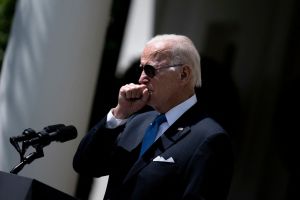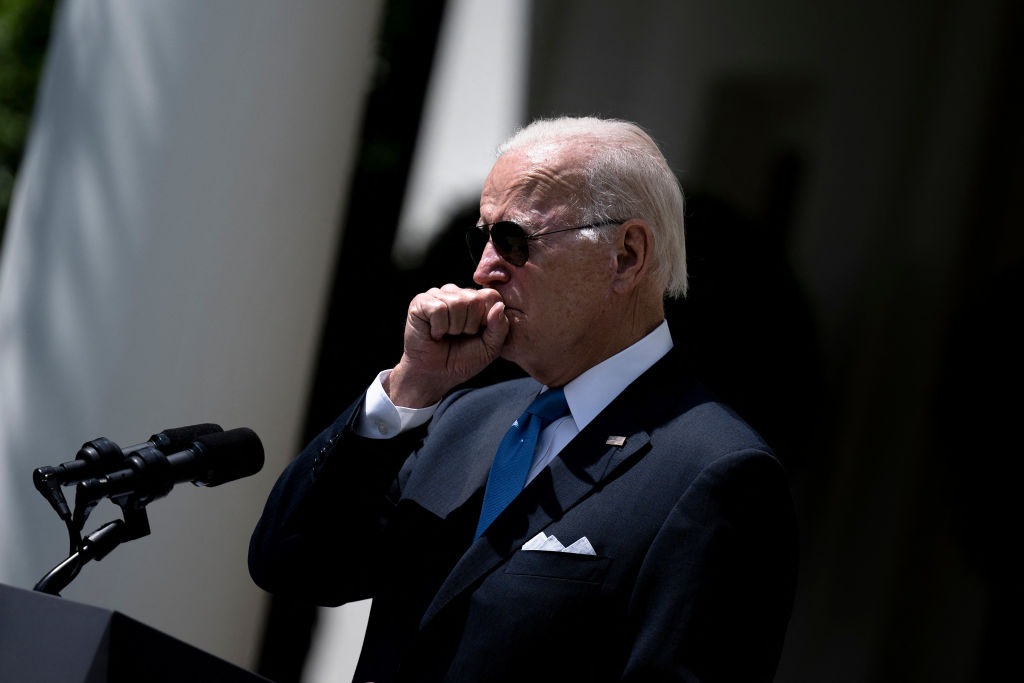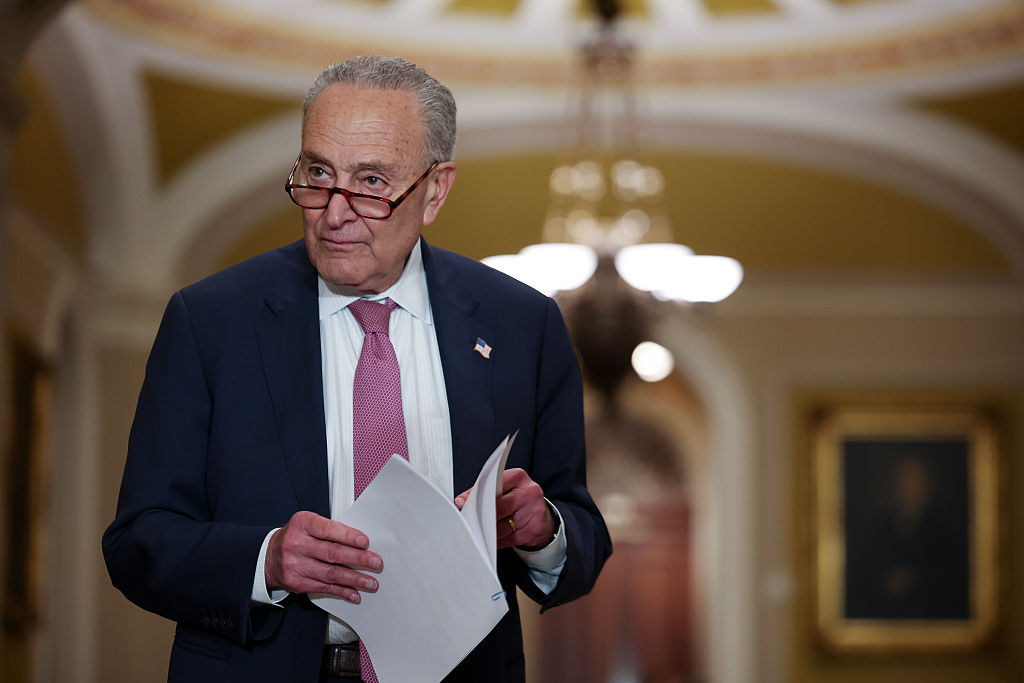J.D. Vance gained prominence in 2016 for appealing to two camps. His critique of the roots of rural poverty, relayed in his bestselling memoir Hillbilly Elegy, was generally well received on both sides of the aisle. After crediting the American Conservative magazine for putting Elegy on the map, the New York Times’s Jennifer Senior wrote in a review of the book that Vance used “a vocabulary intelligible to both Democrats and Republicans.”
Fast-forward seven years, and a lot has changed for Vance. He has evolved from Never Trump conservative to enthusiastic MAGA disciple. And he has also gone from bestselling author to United States senator. But the thirty-eight-year-old freshman US senator from Ohio is proving he’s still capable of speaking such a language. Vance endorsed Donald Trump as the GOP’s 2024 presidential nominee in January, labeled transportation secretary Pete Buttigieg “preposterous” in February for his bungling of the Norfolk Southern train derailment in East Palestine, Ohio, and in March garnered explicit support from the likes of Senator Chuck Schumer and President Joe Biden for the bipartisan Railway Safety Act, which he introduced with Democratic Senator Sherrod Brown, also of Ohio.
The derailment was tragic, but Vance has shown himself well-equipped to respond. His life story includes growing up under a drug-addicted mother, serving as a Marine in Iraq, a degree from Yale Law School, and a career as a California-based venture capitalist and more recently as the founder of a charity aimed at tackling opioid addictions. Throughout the course of the disaster, he’s maintained a foot in Washington and in the state he represents. Vance continues to visit East Palestine frequently and to address residents there, while back in the nation’s capital he’s promised “to hammer the Biden administration on down to make sure they don’t forget about their own citizens right here in northeast Ohio.” That’s in addition to wading into issues regarding Social Security reform, the dollar’s reserve currency status, Authorization for Use of Military Force resolutions, the safety of Boeing 737s, and a “proposal to make birthing free,” among other things.
“Senator Vance has had enormous responsibility placed on him as a freshman senator, and he’s risen to the task magnificently,” says Saurabh Sharma, president of American Moment, a conservative non-profit organization that counts Vance among its board members.
A source who works closely with the senator in DC told me many people were surprised by Vance’s capacity to work across the aisle. They underestimated the man they perceived only as a partisan firebrand who made headlines during his campaign for his “fiery, right-wing persona,” leading the Washington Post to ask at the time whether it was “an act. Or something more interesting?”
How is Vance able to voice controversial viewpoints without completely turning off Democrats and establishment Republicans? He’s upset people with his view that continuing to support Ukraine is “not in our national security interest.” Yet despite his reputation as a “fire-breathing, controversy-embracing populist,” so far at least, fellow lawmakers are taking Vance seriously. Vance himself said he expected “the political environment to be so partisan, that it would be harder to get anything done. In reality, so long as you’re not being a total jerk about it, I think it’s possible to do things.”
For one thing, my source says, Vance has lost — for the time being, anyway — “the target he had on his back” during the campaign season. For another, East Palestine happened so early on in his first term, “People didn’t have time to formulate what J.D. Vance the legislator looks like. They’re still trying to figure him out.”
Sharma credits Vance’s style: “He’s extremely diligent, circumspect and thoughtful.” A spokesperson from Vance’s office summed up their boss’s approach this way: “You can disagree with people without being disagreeable.” Senator Vance is “a personable guy” whose demeanor lends itself to forming relationships and getting things done.
Regarding Vance’s “front and center role” in the East Palestine disaster, Sharma says, “It’s his state, so in the Senate, he has to carry the bulk of the weight. I don’t think he’s trying to posture or position himself… He has changed the script for what is possible as a freshman senator. He is showing that you can do more as soon as you get to DC than people might assume. It’s not that Senator Vance went looking for a fight; he went looking to serve his constituents, and the case came up with what happened in East Palestine that he had to do so at a much grander scale and with much more rapidity than a freshman senator would typically have to.”
Vance will continue to be unabashed in voicing controversial ideas, I’m assured, but he is hyper-focused on holding Norfolk Southern accountable, getting legislation passed to prevent another toxic train wreck and getting his constituents some relief — now.
Vance has his work cut out for him. The Railway Safety Act is co-sponsored by Republican senators Marco Rubio and Josh Hawley, and Democratic senators Bob Casey and John Fetterman. Yet some House Republicans have been hesitant to offer their full support before the National Transportation Safety Board’s investigation of the derailment is complete. What’s more, reports the Washington Examiner, FreedomWorks and other conservative groups are “pushing back against [the bill], alleging that the legislation would inflict new hurdles for businesses while doing ‘little to improve safety.’”
Vance maintains, “You don’t have to wait on NTSB to know that our first responders deserve to know what’s on these trains in the first place.” He said the “solid bipartisan foundation” for the bill makes him “feel optimistic that we can get somewhere.” He also said Norfolk Southern’s CEO “liked the intent behind our railway safety legislation,” though Vance remained skeptical as to whether the company would follow through on its promises.
Vance has also been championing a plan to offer “effectively income replacement for people [of East Palestine] who lost their job through no fault of their own.” He told the Hill that the Paycheck Protection Program, made infamous for its fraudulent use during Covid, is a “pretty good structural basis” for what he has in mind. Vance’s proposal, reports the Hill, “is being greeted skeptically by Senate Republicans as they think about the best way to deliver aid to the community.”
Say what you will of the Railway Safety Act’s effectiveness, Vance’s role in mobilizing support for it is notable, as is his persistence in keeping the derailment in the forefront of fellow lawmakers’ minds as the issue fades from the news cycle. “I would look at anything that J.D. wants to propose,” said Senator John Kennedy of Louisiana. Senator Brown likewise told the Hill he’s “‘open to anything’ on Vance’s PPP idea.”
Also noteworthy is the fact that despite his continued close association with Trump, Vance does not seem to be contending with a “guilty by association” bias from the growing number of Republicans who have turned on Trump in recent months. Vance, my source tells me, is “proud” to have Trump’s support, and it’s reciprocated. Trump’s endorsement in the primary provided a “positive boost.” Indeed, when I visited East Palestine last month, excited residents clad in red, white and blue stood for hours in the cold, drizzly streets to welcome the former president to their town. When Trump appeared, Vance was by his side.
Much has been made of Vance’s so-called “radicalization” in recent years and his evolution from a Never Trumper. But now that he’s in the Senate, it appears the jury is still out. Senator Brown predicted that Vance “would lose his Senate race and move to California,” according to Politico. But after Vance won the election, “Brown called to congratulate him… and it’s been surprisingly rosy between them since.”
Based on his legislative work so far, I’m inclined to view Vance’s “flip-flopping” on Trump and other issues not as opportunism, but as a product of his unique, broad background and his ability to synthesize information on many topics and relate to both sides. It seems from what he’s done in his first few months in the Senate that Vance’s interest in helping the overlooked, poor, white population of Appalachia is sincere. Far from moving back to California, Vance repatriated to Ohio and invested there. The Yale Law professor who encouraged Vance to write Elegy testified recently that Vance “was always first and foremost really kind of homesick and wanting to go back… to help his community.”
Vance was labeled a “radical extremist,” yet managed to win a Senate seat by living among and re-engaging with his people. Now, he’s taking the “crisis” he called attention to in Elegy and collaborating with Democrats to address it. In an interview about East Palestine, Vance referenced sentiments of the small town that are shared by other such rural communities. “These are the people who really lost when we lost our manufacturing base to China,” he told Axios. “And these are the people who are going to be forgotten by the media unless certain voices make sure that their interests are at the forefront.”
In addition to the Railway Safety Act, Vance has “cosponsored a bill with Democratic senators Amy Klobuchar of Minnesota and Ron Wyden of Oregon, to create a criminal penalty of up to five years in jail for people convicted of stealing catalytic converters out of cars,” per Vanity Fair.
In embracing the principles of his homeland, Vance is “making major progress for the ideology he represents,” asserts Sharma. “The Republican party and conservative movement are changing, and all signs point to him being able to deliver.”
Sharma says “few states have been as damaged by failed bipartisanship in DC as Ohio,” and so, as a DC lawmaker whose heart remains in the Rust Belt, Vance will continue to concentrate his message on how free trade, deindustrialization, illegal immigration and overzealous military involvement harm Americans from both sides of the political aisle, and will work on bipartisan legislation to address these problems.

























